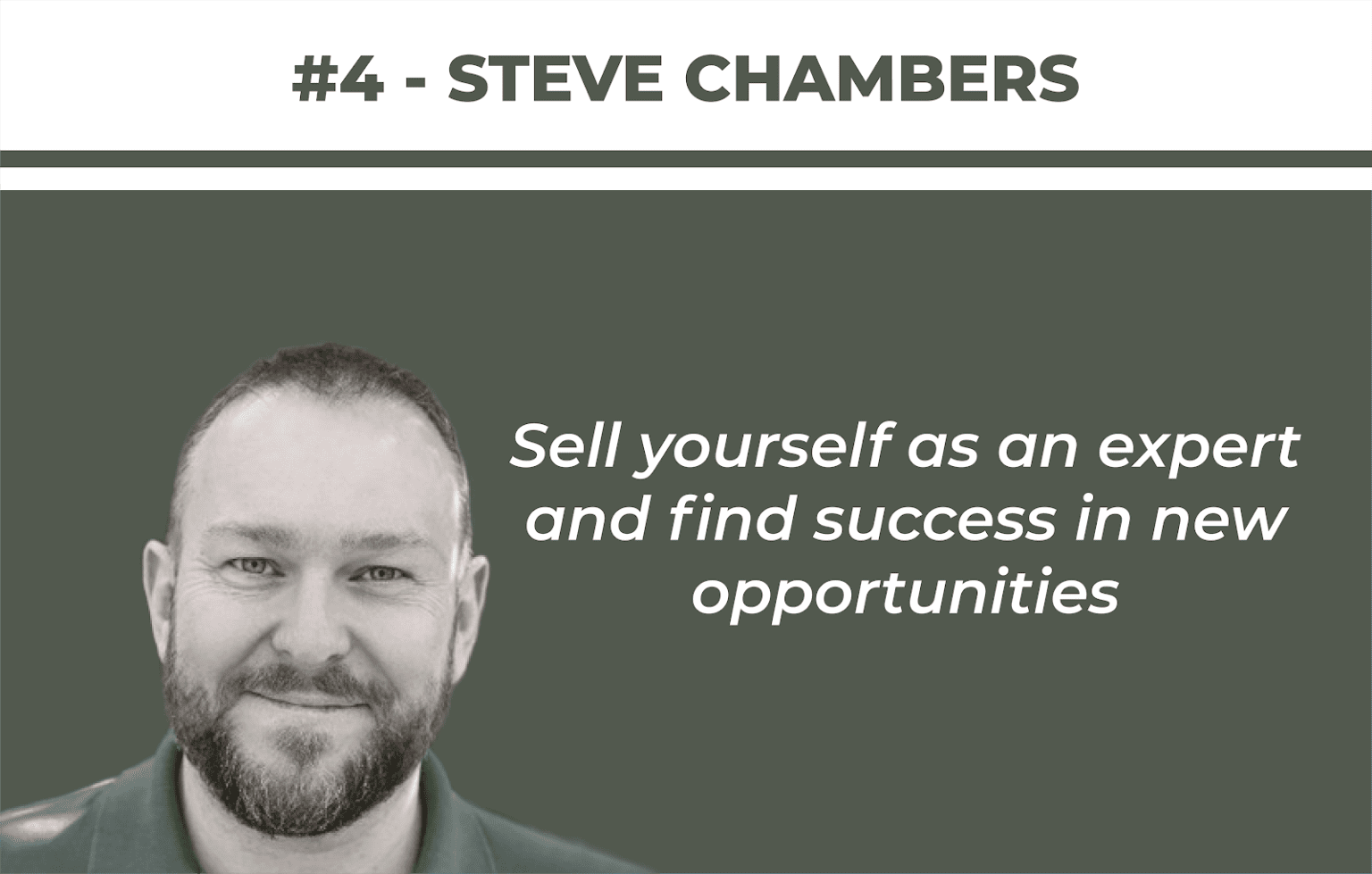Lexi Radcliffe-Hart
Steve is an advocate for charities of all sizes involved in the built environment and sustainable transport sectors. Whilst leading policy and campaigning roles, his portfolio career also includes being a lecturer and media spokesperson.
Reflecting on how he got to be the subject matter expert he is now, Lexi caught up with Steve on our podcast series PortfolioCast to discuss why establishing and communicating your specialism matters and how investing in yourself pays the most – beyond the expected financial rewards.
Q: The roles you have had are many and varied. Let’s discuss how you have made your choices, what has driven your portfolio career along this path?
A: For me personally, although there’s been a lot of different kinds of roles, doing different things, being a campaigner, being an advisor, being a lecturer, I’ve stuck to two niche areas really: built environment, urban planning, and sustainable transport and I’ve sold myself as an expert in those areas. I haven’t spread that part too thin.
Where I’ve been super flexible is with what the doing actually is. That’s where I’ve found myself coming into roles that, at the beginning, I didn’t anticipate something I knew I wanted to do.
I wanted to become a lecturer, I wanted to do that. I didn’t know I wanted to be a campaigner at the beginning that that kind of evolved that presented itself. But all, and this is a crucial thing, I think, based on that subject knowledge that I held myself to.
As my career’s moved on, I’ve identified areas that I thought were useful for me to get into because of where I wanted to go and I have broadened out. But it was a very gradual evolution, it wasn’t just spreading myself too thin in terms of those things. I think the reason for sticking to that niche area is partly because it’s easier to explain yourself and promote yourself.
However, when you look at someone’s CV, you don’t see the rate and you don’t see the reliability of that work. A lot of the choices that I’ve made have been connected to the one thing I think is very important for a portfolio career: having a bread and butter job.
Something that’s reliable, it’s maybe one or two days a week and that work could be there for quite a while. It’s maybe at a lower rate, but that’s going to pay the bills and it might not be the thing that you’re most into.
Then you can use your other days for things that are higher rate, because they’re less secure. They may be the more passion projects for you.
So you don’t see that when you look at a career of a portfolio career person, but those decisions are actually as important as where is this taking me? What am I going to be doing?
Q: That balance between stability and passion is something that we really have to strive for. Often it’s our passion driving us, but that is balanced by fear. We start by saying yes a lot, especially in the beginning, but that can lead you down a path, which is harder to maintain, perhaps?
A: The trouble is saying yes a lot, and filling your time with work, is that may prevent you from having time to promote yourself to look for new work.
The way I do it now, because I’ve actually had two stints and a portfolio career – I did it once, I went back into full time for about two years and came back out again – what I do differently now is I only programme four days of work. The fifth day is self promotion, it is looking for new business.
If you think about it, you’re your own sales person, you’re selling yourself, and you need to maintain this level of work.
If I’m really honest, before I didn’t programme five days of work, I just took work and did it. I realise now that was a mistake. I’m very fortunate that I enjoy what I do, but that can also be a curse because you can be ending up working seven days a week.
By having that day that is not working for clients, it’s working for yourself and giving yourself the opportunity to do more. From making sure you have a good website to doing media appearances, not for a client but just presenting myself as an expert that will generate interest. Blogging just for me, not for clients, that has sparked interest as well. And just recording things that I’m doing and presenting that to the world. I’ve started spending time to actually update my own website, to keep a record of achievements, of things I’ve been writing here and there.
I don’t know how common it is for people today, but for me personally, it really works to have one day a week where I am promoting myself, and I’m needing to then get what I need for my income for the other four days. And that’s no bad thing. I think.


It can include infrastructure as well. It’s boring things like you know, having a really good email system, having your cloud storage sorted. All of this kind of stuff is an investment in yourself. And it takes time, I don’t want to be doing it in the gaps of time I have between other things and not making good choices.
If you’re choosing work without time to really think about it, then you’re probably not going to make the greatest choices. And if you’re fully programmed with work, and maybe you made choices where the rate isn’t so high, and you’re unable to take on new work and you think, “Oh, well, I’m happy with what I’ve got, I don’t let this client down.”
If you’re creating that cushion of time, that you have that much more flexibility you can go for and get better work.
Q: Would you recommend anybody doing something like media training, to advance themselves or to, as you say, invest in themselves, to take themselves to the next level?
A: I think if there’s a real chance that you’re going to be doing media inquiries, or if you already started to do them, I think that’s the perfect time to do it.
So when I did the training, I’d only just started taking speaking opportunities, and it became apparent I would be doing more. That training lasted a day, and I was able to connect with experiences that I’d already had. So I’d say that’s the moment to do it.
But my thing with training to teach and also with the media is this was something that I didn’t feel super confident about. So for me, that was the time that I knew I needed to do training, some people just can go off and kind of do this, and be super confident, happy with it. That’s fine, they have an innate thing for it. But these experiences for me anyway, tend towards being the potentially nerve wracking kind of experiences.
If you’ve got all your tools sorted, that’s going to make things a hell of a lot easier and remove a lot of that pressure. So if you’re someone who does get nervous, or do in this kind of situation, do yourself a favour and get training. And I’m sure that’s true for many other high pressure, things like that. Make life easier on yourself.
Q: We’ve talked a bit about balancing your week, by having the opportunity and taking that time to reinvest in yourself. But how do you find balance and prioritise between your roles between your responsibilities, whilst also creating that work/life balance?
A: That can be difficult because clients often like your availability every day for them, rather than setting time aside: “this is Monday, I’m going to work for you and what I’m not gonna check emails for a week?”
They do kind of bleed into each other. But that is something that’s really kind of valued. I think technology is the answer. I use multiple email addresses, individual email addresses for clients. So stuff is sorted that way, ensuring no mix up.
I’m not quite sure how I juggle. I feel like just leaving enough time and not having too much work really helps. Because if I was answering this question before, like the previous time I was working like this, it was chaos if I’m really honest. I did work, deadlines were due, I was going from one thing to another, I was doing incredibly long days. I was earning less as well.
That’s the thing, I really cannot stress that enough. If you make better choices, you will earn more. Working like that, having too much work is just not a good recipe.


Now I’m much more disciplined. I’m not especially setting aside days of individual clients. I will work for multiple clients across the time.
Some things have to happen at a particular time – lecturing, obviously, you know, you’re in the room at that time.
Interestingly, in the COVID era, I’m travelling less. And that helps, I feel like I have more time. So when I was like going between clients and going to lecturing, wherever, a lot of time was spent travelling. Meals grabbed while travelling feels like the theme of how my life was, and there’s less of that now. I’m travelling a bit more for work, which is lovely, but it’s not racing between meetings. So that’s helped.
Honestly, I think the answer is don’t give yourself too much to do. Be organised. I use a very basic, Trello style, sort of task management. I think that works for me. But yeah, I really do think that the number one thing is just don’t overload yourself.
Q: Is there any advice that you would give, for somebody trying to make the decision of, should I stay in my nine to five, or should I actually make this jump?
I mean there’s a lot of people at the moment who are facing redundancy, or are on furlough and not sure what’s coming up or even just not happy in what they’re doing. And have realised after being stuck in it, and not feeling like they have a way out? What would that advice be?
A: Well, I’ve kind of got recent experience of that. As I said, I went back to full time work for two years, I had two experiences where I thought “Actually, this isn’t the right thing for me, I’m gonna go back to a portfolio career.” And it’s really hard to set one up from scratch or while you’re in that employment full time.
If you can negotiate going down to four days for a while and use the fifth day, almost like I do, to start up, get your first client and do something else. That’s one way of doing it. But honestly, starting a portfolio career is like someone who says they’re gonna go on an around-the-world trip, and the hardest thing for them is to just buy the ticket. Buy yourself the ticket.
There’s a lot of anxiety about earnings and all that kind of stuff. I mean, not everyone’s gonna be able to do this, I know. But if you can try and find a way to get your finances sorted, so you could live with reduced income for six months. And maybe not up to the level where you really want to be for a year, but six months of really reduced income, then maybe another six months of not quite where you want to be. Allowing for that.
That will actually help you. Because you’ll remove the anxiety and you won’t make bad decisions, so you’ll end up earning more anyway, because you will make better choices. You won’t pick up work, and then not be able to do the better thing because you’ve picked up something else.
But really, if you can get that six months organised, if you’re already in that employment, maybe you need to put some money aside, I know everyone can’t do that. I know it’s an incredibly privileged thing to be able to do that. But if you can, it will remove that anxiety, and you’ll just enjoy it more. It’s not fun doing it with anxiety and feeling awkward, because you look terrible.
And also one bit of advice I had recently which is good for everyone in a portfolio career, but especially at the start. If you are not embarrassed, asking for your rate then it’s set too low. And you know, it’s a marketing rate, it’s a starting point for conversation. If you’re not embarrassed asking for this amount of money, then you set it too low.
You really don’t sell you, I mean, let’s be honest, at the beginning of a portfolio career, you might make choices that are not the same as later on. You want to get some work, you want to be in the world you need to be in. Going back to that idea of things that are more stable, but maybe not so well paid. Also look at what is this organisation like? Who’s in it? What’s their network?
Networking is one of those powerful things in a portfolio career. You might choose a gig that gives you access to people, whose projects might have an extended kind of governance that has influential people in a particular area. That’s good to be a part of, so you might make some decisions, again, for a lower rate, that are around, not just stability, but considering “where could I go on to next from this role?”
So I really, really advise and very careful choices around that juggle these different – you need to eat! But also, you know, kind of where, where am I going to go? Where could this bring me on to next?
Listen to the whole conversation on Episode 4 of PorfolioCast:
Think this sounds like the right path for you? Come along to our monthly Get started event for new members to find out what a portfolio career could look like and how The Portfolio Collective can help you take those first steps towards professional success – and don’t forget to connect with our community!




One response to “Portfolio Journey Series: Steve Chambers”
Really interesting – Steve is a real pro. He has really thought through how to optimise his portfolio career for long term success